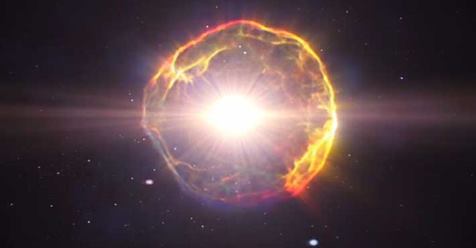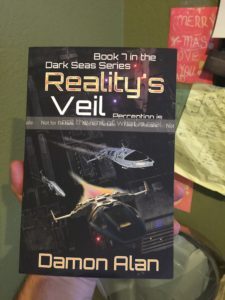Damon Alan's Blog, page 2
April 16, 2019
Finally
I know it’s been too long since I’ve released a book. I’m not George RR Martin in that category, but it’s been 11 months and that’s too long to be honest.
The good news is I have the third book in the Worlds at War series sitting next to me on my desk, critiqued except for the last 3 chapters and almost ready for publication.
The bad news is it will still be four weeks or so before you see it.
More good news is I have book 7 in the Dark Seas series almost ready to go, I want to write a few more chapters to add some action earlier in the book. So I will be releasing two books over the next three months, most likely.
More bad news, in a sense, is that I am part of an excellent critique group now that I am running my writing through as I can, and it’s probably not going to allow me to publish more than a book ever 3-4 months or so.
The good news is that having a critique group helps to keep me writing, because I have an expectation that I will submit material for them to critique.
Whew! That was up and down.
The post Finally appeared first on Dark Seas - Damon Alan's Author Page.


March 19, 2019
Space Opera can be short.
Space Opera, in all its magnificence, doesn’t have to be a long story. It can be short and tell an interesting or funny tale. And even if it’s used to sell a product, the story itself can be entertaining.
The post Space Opera can be short. appeared first on Dark Seas - Damon Alan's Author Page.


March 7, 2019
Speculation
What if life is everywhere, but we haven’t found it because there is no land on the worlds it exists on? What if Earth is an ultra rare world in that it doesn’t have deep oceans covering the entire surface.
It would only take another 7 miles of ocean depth to ensure that no spot on the crust of the Earth saw daylight, after all.
It could be that the universe is teaming with intelligent life and it all speaks marine languages.
One third of discovered worlds may be Oceanic planets.

The post Speculation appeared first on Dark Seas - Damon Alan's Author Page.


February 11, 2019
Working Cover
The working cover (meaning it may well change) for Book 4 in the Worlds at War Series.
 Dwarves discovering the remains of a ship on a subterranean sea.
Dwarves discovering the remains of a ship on a subterranean sea.The post Working Cover appeared first on Dark Seas - Damon Alan's Author Page.


February 9, 2019
The Men of War
It’s been a long time since I’ve done an update. Not because I’ve quit writing. Quite the opposite. I’ve been writing like a madman.
On January 8th The Men of War was 8,000 words. Yesterday, February 8th, I finished it in first draft.
It’s going to go in front of my critique group, which is how it gets to be the best it can be. So I expect it to be available in mid-May in ebook and print.
Other good news: I was too late to sign up for Denver Pop Culture Con (formerly Denver Comic Con) and didn’t think I was going to get in as an author there. Yesterday I got an email inviting me to be an author there on Authors’ Alley, so I’ll be there. I paid for my table yesterday.
Come to think of it, yesterday was a pretty good day.
Here is what I believe to be the final print cover for The Men of War. I will put it up for pre-order sometime in early May, I’ll let you know more closer to the day.
 Harry and his team moving into the mountains, trying to avoid the pervasive eyes of the Wizard Hagirr.
Harry and his team moving into the mountains, trying to avoid the pervasive eyes of the Wizard Hagirr. The post The Men of War appeared first on Dark Seas - Damon Alan's Author Page.


December 17, 2018
Extinction, Galactic Style
I found this interesting, so I thought I’d share it with you.
I’m not sure I buy that it would be 100% fatal to some species, but not others. If it killed off Megalodon, why wouldn’t it have killed off elephants? They had zero protection from water. Or mammoths, or giraffes… the list of large land animals that should have been heavily impacted isn’t small.
Still, it’s an interesting theory, and I’ve always wondered how far back we can follow our solar system’s history through the galaxy. If we can tell who past neighbors were for any length of time we should be able to associate galactic events with events on Earth.
Extinction via exploding stars.

The post Extinction, Galactic Style appeared first on Dark Seas - Damon Alan's Author Page.


November 23, 2018
You might say…
that it has been a long time since I put a post on here, and you’d be right.
Here is part of the reason why.
I got the proof in the mail today, I’m extremely pleased with the cover, and now my editor will make a pass over it. Once that’s done, I’ll make any corrections, and hopefully this will be available by Christmas.
I’m 15% of the way into The Men of War, the next book in the Worlds at War series. Seems winter can be a productive time after all.
The post You might say… appeared first on Dark Seas - Damon Alan's Author Page.


October 11, 2018
End of the Year?
Book 7 by the end of the year? It’s been a while coming. I’ve had some writers block over the summer, and to be honest… there simply isn’t any excuse for it. It’s time to get the space opera ball rolling again.
So expect a renewed push for Book 7, Book 3 in the Worlds at War Series, and a stand alone space comedy, Odd Space.
Fingers crossed.
The post End of the Year? appeared first on Dark Seas - Damon Alan's Author Page.


Hopefully by years end
I have one more chapter to write for my critique group. At least in Book 7 of the Dark Seas Series.
Then I need to write a few chapters of interest for the story that are one-offs, all the Admiral’s Logs, and edit the main body with the input from my critique group.
I’m getting close enough to taste the release of this one. LOL.
Then it’s on to Book 8, the next to last book in this series.
The post Hopefully by years end appeared first on Dark Seas - Damon Alan's Author Page.


October 4, 2018
Why So Quiet?
When I was a kid I wanted nothing more than to hear that we’d discovered alien life. Well, almost nothing. My own spaceship would have been super.
It doesn’t surprise me we haven’t found it.
This article explains part of the reasons why: We haven’t searched enough space yet.
I’m talking intelligent life here, not the bacteria eating a rock kind, or even the worm at a hydrothermal vent kind. Those would be amazing to find, but I think they’re going to be common. Very common. I suspect that a few miles down, under the Martian surface, that microbes are eating rocks and living super-long and slow lives in the darkness. Why? Because that’s what’s happening here on Earth, and if life ever existed on Mars it had plenty of time to evolve a way to survive as the planet died on the surface.
I wouldn’t be surprised at all if Europa had life in those vast oceans. It likely has hydrothermal vents on the rocky surface under that 60 mile deep sea, which is all life needs to get started. Energy, a liquid solvent, and the proper elements.
It doesn’t surprise me that we haven’t found intelligent life, however. Because I think the situations needed to create intelligent non-marine life are going to be exceedingly rare.
Consider us. What had to happen for us to exist?
First we had to have the appropriately laced star form. By appropriately laced I mean it was a third generation star that has enough heavy elements to cover the chemical processes of organic carbon based life.
So our star formed, and with it the planets. Jupiter immediately formed and began a death spiral in toward the sun, obliterating any young proto-planet it met on the way or tossing it out of the solar system. In our star system the gas giant stopped inward progress and receded back out to the current orbit. Why? Because of the gravity of Saturn, another massive gas giant. Without Saturn to moderate Jupiter, Jupiter would either be a hot Jupiter orbiting the sun super close in, or it would have been absorbed into the sun by now. And where would Mars, Earth, Venus, and Mercury be? Most likely wherever Jupiter was, but potentially frozen in deep space. Either way, no life on Earth.
Then Thea, a Mars sized body, crashed into Earth and ripped off enough material to make our Moon. Why is that important? Because without the gravitational anchor of our Moon, the axis of rotation on Earth would swing a lot more than it does. That would create wildly varying seasonal weather patterns that life wouldn’t be able to adapt to very well. There’d be life in the oceans, but only plants would probably be on the surface. Animals need a more stable ecosystem, and most plants do as well. Few plants survive from the tropics to the arctic, for example, and that’s what would be needed. Thank goodness for the Moon.
Next the period of orbital bombardment. Too little and the Earth is a desert. Too much and we’re an ocean world. We got exactly the right amount to not only give us land, but to make sure that most of that land had enough precipitation to provide water for life.
Next come the threats that exist for life on land. The first is simply that it took 3.5 billion years for life to go from unicellular to multicellular. That must be a very hard leap to make, and might simply not happen in a lot of places out there with life.
After that we have the extinction events. Asteroid strike, gamma ray bursters, volcanic events. All of which have happened here. If the dino killer had been bigger, it would have sterilized the planet 65 million years ago, for example. But it was just the right size to kill all large animals and give us mammals a chance since we were small at the time and survived.
There are some indications that two different gamma ray bursters have caused massive extinction on the planet at different times. Super dangerous, they kill life on the facing side with an immediate dose of radiation, and life on the far side with an atmosphere rendered toxic.
Ever hear of the Siberian Traps? An amazingly massive volcanic event that happened in Siberia, far bigger than Yellowstone, Toba, or any other volcanic event to ever happen on the planet. Most like died when that event happened. By comparison it’s thought that 75,000 years ago Toba erupted and reduced the human population down to a few thousand mating pairs. A bit bigger Toba and we’d have no humans today.
Get my point? The universe is an exceedingly dangerous place and we had to be so very lucky to get to the point where Leonardo Da Vinci was able to paint Mona Lisa.
That doesn’t even consider the future threats.
Asteroid strike is still very real as a possibility in our future.
Nuclear war, or even all out conventional war.
Plague.
Isotopic contamination of our planet due to nuclear meltdowns at our antiquated nuclear facilities. (it happens if the cooling pools run dry)
Cultural stagnation. If Wahhabiism or ISIS style Islam takes over the planet, for example, we’ll enter a new dark age of science and exploration. No reason that couldn’t happen with aliens.
Resource depletion. If we don’t get to mining space soon, this is a serious possibility. This leads to massive warfare over what remains.
Self-poisoning. Asia and Africa are poisoning our oceans. Together they are putting 90% of the plastic into our seas, and probably all sorts of other toxicity as well. If that doesn’t stop, and the oceans die, so do we in time.
The singularity. We create AIs, those AIs see us as a threat, and poof, no more humans. They’ll be a million times smarter than us and a million times faster. If we research AI and it doesn’t love us, we will cease to be.
Rogue science. It’s not at all out of the question to think that science might create something that obliterates us, from a smallpox variant to a rip in the structure of space time.
All of these things that created us happened. All of these things that might uncreate us haven’t happened. But that doesn’t mean they won’t, and just because in the short time we’ve been here it hasn’t happened doesn’t mean that other rising civilizations, those that climbed the first obstacles to rise into existence, don’t obliterate themselves before they can become starfarers or even signal senders that we might pick up.
No. I don’t think in a universe with trillions of galaxies we’re alone, but I think we’re exceedingly rare. As in we might be all there is in our galaxy or local group.
We should really start taking better care of our planet and pushing harder to get into space. Our time, and our chances, are limited.
The post Why So Quiet? appeared first on Dark Seas - Damon Alan's Author Page.






